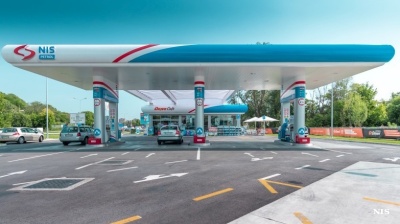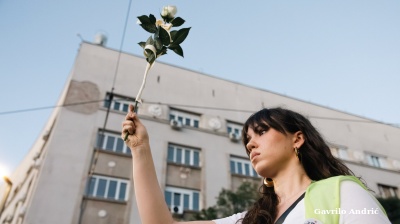The ruling Serbian Progressive party (SNS) convincingly won regular local elections in the capital Belgrade on March 4, taking 44.8% of the vote. The SNS will have 63 of the 110 seats in the Belgrade assembly, which means it can form a local government alone.
The SNS was helped by the fractured opposition — of the numerous opposition lists running just one genuine opposition group managed to pass the threshold to enter the city assembly. The high turnout also helped the SNS to victory; over 51.3% of the 1.6mn people with a right to vote turned out on March 4. Serbia uses the D'Hondt method which increases the threshold as the number of voters goes up, reducing the chances of smaller parties entering the assembly.
While the SNS can rule Belgrade without coalition partners, the party's leader, Serbian President Aleksandar Vucic, has already said it will continue its partnership with the Socialist Party of Serbia (SPS), which earned only 6.1% of the vote or eight seats in Belgrade, but is the SNS’s coalition partner at national level.
SNS leader Ivica Dacic was more than happy to echo Vucic’s words, and has already announced a “victory for the coalition”. Despite their modest results, SPS members looked very happy on election night, mainly because of the good result for the SNS. By contrast, the SPS’s own campaign was lukewarm and uninspiring.
The SNS and SPS are two of just four lists that managed to pass the threshold to take seats in the city assembly of the 24 that participated in the race. Vucic described Belgrade’s March 4 elections as a “festival of democracy” because of the large number of lists.
According to the latest preliminary results published by polling agency IPSOS based on 98.4% of votes counted, the runner-up is the list headed by former mayor Dragan Djilas with 18.8% or 26 mandates.
A surprise third is former water-polo player and head of the New Belgrade municipality Aleksandar Sapic with 9.4% of the vote (13 mandates). Sapic did unexpectedly well given his perceived lack of political skills and the fact he has spent the last four years outside politics running a charity foundation that helps parents to find funds for medical treatment abroad for their children through SMS donations.
Sapic was seen by many as a “fake opposition” figure intended to split the opposition vote and prevent other candidates from challenging the SNS, though he has denied this.
Democrats defeated
By contrast, aside from Diljas’ list the other opposition parties performed poorly. It was a humiliating defeat for the Democratic Party (DS), which for the first time in its history failed to pass the 5% threshold. This dashed hopes that the return of many politicians who had previously left the DS to work with it ahead of the election could herald a revival in its fortunes.
The DS is seen as an important democratic institution in the country because of its background: the party had a crucial role in the struggle against the dictatorship of Slobodan Milosevic in the 1990s and led Serbia’s first democratic government. The DS was also a key player in forming the Democratic Opposition of Serbia (DOS), 18 parties which managed to unite and oust Milosevic in massive protests on October 5, 2000, after more a decade of autocracy, economic collapse and thousands lives lost in his civil wars throughout former Yugoslavia.
The Liberal Democratic Party (LDP), also seen as a modern and democratic rival to the ruling party, likewise failed to make it past 5%.
A future leader?
Overall, the main message of the March 4 local elections in Belgrade is that the SNS’s victory was gained thanks to the disunited and fractured opposition. On the other hand, the election results indicate that Diljas has the potential to bring together the opposition in future.
Diljas was Belgrade’s mayor from 2008 to 2012, and is a former member of the DS. In the March 4 elections, Djilas headed a list composed of relatively new political parties on the Serbian political scene. All are headed by well known politicians including 2017 presidential election runner-up Sasa Jankovic and third placed Vuk Jeremic. Both Jankovic and Jeremic went on to found their own parties, which are now backing Djilas. Among them is also the Serbian Left, led by former DS official and head of the team for negotiation with Kosovo Borko Stefanovic.
After DS leader and former defence minister Dragan Sutanovac announced changes following his party’s bad results, Djilas may pull the DS into his orbit. Among the coalition around the DS were former Serbian president and DS leader Boris Tadic, who now heads the Social Democratic Party of Serbia, as well as former prime minister and New Party leader Zoran Zivkovic. Djilas was Belgrade mayor while Tadic was president, and the two used to be very close associates, so while unpredictable, future cooperation doesn’t look impossible. Another former DS member, LDP founder Cedomir Jovanovic also has the potential to join this club.
News

US–China soybean sales restart
According to Scott Bessent, US Treasury Secretary, the agreement marks a significant step towards restoring normalcy for American farmers.

Russia faces $50bn annual losses from oil sanctions as Lukoil exits international assets
Russia is expected to lose at least $50bn annually due to oil-related sanctions, as Moscow’s largest private oil producer Lukoil agrees to sell its international assets and Germany considers nationalising operations owned by state-run Rosneft.

Chicken and chips in Seoul - for Nvidia, Samsung and Hyundai
In a low-key fried chicken shop in southern Seoul, the leaders of Nvidia, Samsung Electronics and Hyundai Motor held an informal meeting on the evening of October 30.

Presidents Lee and Xi begin diplomatic chapter at APEC summit
President Lee, who is chairing the first session of the summit at the Hwabaek International Convention Centre, stood at the entrance to personally welcome participants. President Xi reached the venue at approximately 10:02.




